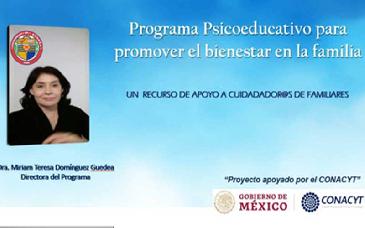

Note posted: 11/01/2021
Hermosillo, Sonora, January 11, 2020.- The University of Sonora has a psychoeducational program available to the entire community to promote family well-being. A support resource for family caregivers – older adults and children – an effort led by Miriam Teresa Domínguez Guedea, professor in the Department of Psychology and Communication Sciences.
This program can be taken free of charge by those who are interested in this subject and especially by people who take care of their elderly relatives, children and / or adolescents.
“This action consists of a series of animated videos on a YouTube channel that provide psychological guidance for managing the well-being of those who care for others,” he said.
He indicated that the contents will include a basis for understanding the crisis from human experience, the fundamentals and strategies for strengthening well-being and psychological resources, improving communication aimed at appreciative understanding of emotional needs, and problem-solving skills in managing difficulties.
He also pointed out that the invitation to all people to visit the Cuidamos Familiares YouTube channel (www.youtube.com/channel/UCF6VmhiWSf9GXfFbuE2AhhA) has been extended, as well as to use this support resource for the whole community. The video presentation of the program is at: www.youtube.com/watch?v=IXwVM_1-V78.
The postgraduate academic in health sciences stressed that the project was supported by the National Council of Science and Technology (Conacyt), in its Call for Universal Access to Knowledge projects in the face of the Covid-19 emergency.
The importance of the program
Domínguez Guedea commented that the number of elderly adults in need of daily care is increasing worldwide and that in Latin American countries this process is taking place in a worrying way, given the social and health difficulties faced by a significant part of the population.
To this circumstance, he added, is added the current health crisis due to covid-19, in which people aged 60 and over are among the groups with the greatest vulnerability in terms of morbidity and mortality.
“Daily care tends to generate significant economic, physical and emotional needs, which are usually absorbed by one or more family members, especially middle-aged women, with overtime for employment, domestic demands and more care. family members; for example, minors “, the academician specified.
He stated that socio-cultural premises still prevail in Latin contexts that normalize this overload of tasks as a responsibility that belongs only to those who care about them and that, therefore, social and institutional support mechanisms are rare.
“Thus, it is not surprising that caregivers feel stressed by the amount and diversity of demands they face every day,” he said. For this reason, the Psychoeducational Program provides a support resource that enhances caregivers’ ability to meet the challenges of daily care, especially in these times of pandemic.
Project collaborators:
Miriam Teresa Domínguez referred to the fact that, within the project, she had a valuable collaboration of academics and students from the Department of Psychology and Communication Sciences and the Postgraduate Program in Health Sciences from the University of Sonora, researchers from El Colegio de Sonora , professionals from the General Directorate for Health Promotion and Disease Prevention within the State Secretariat for Health, as well as psychotherapists from civil society organizations (Jiapsi-Centro de Desarrollo Personal, Familiar y de Pareja, AC; Red Sonora de Apoyo Psihosocial en crisis, AC and Dorita de Ojeda Therapy and Rehabilitation Center).
They also shared their experience and knowledge for integrating program content, caregivers, children, teens and older adults from different parts of the republic.
He also highlighted the work of academician Marcela Martínez Preciado and student Ana Abygail Guzmán Ríos, from the Digital Content Production Laboratory of the Bachelor of Communication Sciences, who produced the videos that make up the psychoeducational series.